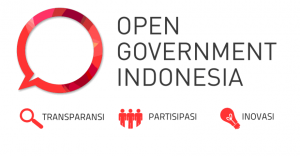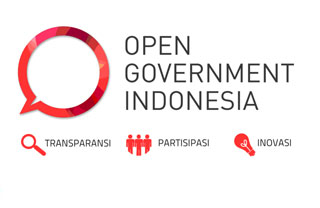 At the October 2013, the Annual Summit of the Open Government Partnership (OGP) in London, England, the Government of the Republic of Indonesia was installed as the International OGP Chair until 2015. The OGP is a movement for government openness which aims for transparency and accountability in the public service. In Indonesia, the OGP movement has been driven by government in partnership with civil society organisations (CSO). Besides public service accountability and transparency, the OGP also encompasses the governance of natural resources, for such as mining governance. Indonesia joined the OGP movement at its inception and is recognized as an initiative nation. To this point, 61 nations have joined the international OGP movement.
At the October 2013, the Annual Summit of the Open Government Partnership (OGP) in London, England, the Government of the Republic of Indonesia was installed as the International OGP Chair until 2015. The OGP is a movement for government openness which aims for transparency and accountability in the public service. In Indonesia, the OGP movement has been driven by government in partnership with civil society organisations (CSO). Besides public service accountability and transparency, the OGP also encompasses the governance of natural resources, for such as mining governance. Indonesia joined the OGP movement at its inception and is recognized as an initiative nation. To this point, 61 nations have joined the international OGP movement.
Last year, the government together with member NGOs of the Indonesian OGP Core Team initiated 3 (three) program strategies for ensuring the success of the OGP movement in Indonesia, namely:
- The strengthening and accelerating of programs that are currently underway, specifically, the implementation of Law No. 14, 2008 on Public Information Openness (UU KIP), as the UU KIP is directly related to public service accountability and transparency.
- Implementing new initiatives/OGP pilot projects in three areas, namely Central Kalimantan Province, Ambon City and Indragiri Hulu District. In these pilot projects, the government has been implementing budget transparency, whilst the open schools program is encouraging schools to implement transparency, especially in the management of BOS and the receipt of new students with an online system and software, as well as making several government websites more open and provide transparency of public service information that is more easily accessed by the community.
- The development of public participation and information openness portals, such as a public service portal (SatuLayanan.net), a public body transparency portal (SatuPemerintahan.net) and an integrated map portal (One Map).
In order for this OGP movement to achieve its expected aims, namely public service accountability and transparency, there needs to be a role for civil society as partners of government. For this, in order to support the Indonesian OGP movement, an OGP core team was established from 7 (seven) government representatives and 7 (seven) CSOs in partnership. The seven government representatives are the Presidential Working Unit for the Supervision and Management of Development (UKP4) that serves as the Secretariat, the Ministry of Communication and Informatics (Kemkominfo), the Ministry of Foreign Affairs (Kemlu), the Central Information Commission (KIP), the National Development Planning Body (Bappenas), Ministry of Home Affairs (Kemdagri), and the Ministry of Administrative and Bureaucratic Reform (KemPANRB). Currently, the seven civil society representatives (CSO/NGOs) are the Center for Regional Information and Studies (PATTIRO), Transparency International Indonesia (TII), the Indonesian Forum for Budget Transparency (FITRA), the Indonesian Centre for Environmental Law (ICEL), the Aceh Anti-Corruption Movement (Gerak Aceh), JARI Central Kalimantan and Legislative Monitoring Committee Makassar (KOPEL Makassar).
It must also be recognized, that CSOs as partners and one section of the core team is not yet enough for protecting the OGP movement in Indonesia. For instance, in the implementation of the principle of partnered alignment with government representatives, the roles of NGOs at this point are still dominated by engagement. This is in spite of several joint initiatives being achieved, such as the Open Budget Index (OBI) or NGO initiatives that have been agreed on and supported by both parties, such as the implementation of the UU KIP through a program of local government supervision and guidance in public information service and provision, through the Documentation and Information Officer (PPID). There are still, however, Indonesian OGP action plans and programs that have involved minimal engagement with NGOs. This has included a public service transparency program concerning the implementation of the haj pilgrimage and marriage in KUA with the Ministry of Religion (Kemenag), or service transparency with regard to SIM, STNK, BPKB and SKCK in the police department.
Importantly, the alignment between CSO representatives and government will continue to develop OGP initiatives in the future. A forum for dialogue within the OGP core team that occurs every two months, continues to need optimisation so that it can leverage greater and more genuine participation. There also needs to be a forum for dialogue that discusses public service accountability and transparency where community participation is not limited, where anyone can participate. This forum for discussion must be more intensive, cost-effective and not limited by space, using internet technology through an online discussion
PATTIRO contends that it has already become a responsibility of government and the CSOs (NGO) that are engaged in the Indonesian OGP core team to initiate this forum for discussion. Actually, UKP4 has somewhat done this, with the making of a website named “LAPOR!” (http://lapor.ukp.go.id/). However, this site is still limited, mainly due to its model of interaction with the community, which needs to be more in-depth. The site could be improved with a virtual world discussion forum that is more actively co-managed by government and NGOs. If co-managed, it would certainly improve information accountability and transparency making it more open and increasing community confidence.
Furthermore, due the limitation of their resources, NGOs also have constraints to their monitoring of and advocating for accountability and transparency of public services delivered by the government. As a result of these limitations, NGO work is only concentrated into specific fields of engagement. As an example, PATTIRO, who had been working in the field of public policy and services at the local level, have largely geared there work towards local government, while at the national level working with the Ministry of Home Affairs. This is the case with other NGOs, which are also limited to the fields in which they are engaged. This has resulted in not all programs for the transparency and accountability of government-run public services being run within the OGP structure. With regards to the Ministry of Religion program for accountability and transparency in haji services, this had meant there has been minimal NGO/CSO participation as there is as yet no organization that focuses on such issues. The same is also true for public service accountability and transparency in the police department. To force NGOs to concentrate on such issues is also difficult, due to their limited resources. The involvement of NGOs can only be balanced with institutes, when NGOs are within such fields.
A model of partnership like those above can encourage the development of better partnerships that can become examples for other member countries of the International OGP organisation. From the three international OGP annual summits that have been held, we are yet to see one model of partnership between government and NGOs that is effective in all countries. As chairman, Indonesia has the opportunity to one effective model of partnership between government and NGO. Although, such a model would have limitations in that it could not be applied to all nations, if a good partnership between government and NGOs was established in Indonesia, this could become an effective example for other OGP member nations in the development of a model of OGP partnership for their country.
Sad Dian Utomo | Executive Director of PATTIRO
saddian@pattiro.org | 0812 800 3045
Contact Person: Adnan Rahmadi | Communication Officer
adnan@pattiro.org | 081 808 240105





